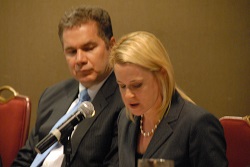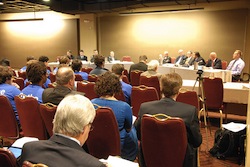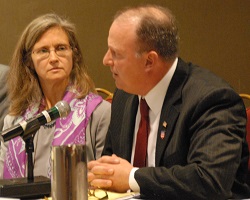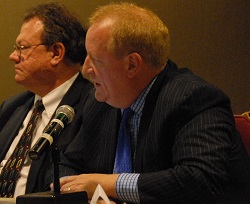Iowa petroleum retailers interested in offering consumers higher blends of ethanol and biodiesel are encouraged to apply for the “Fueling our Future” pilot program to consider applying for cost share funding. A total of $250,000 in federal funds are available through the Iowa Renewable Fuels Infrastructure Board to support projects that will increase the usage of higher blends of both ethanol and biodiesel.
 “The renewable fuels industry has been a great asset to Iowa’s economy and making higher blends of renewable fuels will give customers greater access to clean burning, home-grown renewable fuels,” Iowa Governor Terry Branstad said. “It is important we help create opportunities for customers to see the benefits of higher blends of ethanol and biodiesel.”
“The renewable fuels industry has been a great asset to Iowa’s economy and making higher blends of renewable fuels will give customers greater access to clean burning, home-grown renewable fuels,” Iowa Governor Terry Branstad said. “It is important we help create opportunities for customers to see the benefits of higher blends of ethanol and biodiesel.”
The Fueling Our Future pilot project is designed to reduce particulate matter (PM-2.5) vehicle emissions by increasing the use of higher blends of biobased fuels, specifically ethanol and biodiesel. Applications must be submitted by Feb. 7, 2014 and will be reviewed by the Iowa Renewable Fuels Infrastructure Program board of directors at their quarterly meeting later that month.
All Iowa petroleum retailers offering fuel to the general public are eligible to apply. Applicants must provide a minimum 50 percent match and the total assistance available is capped at $250,000 of matching federal funds. Funds will be targeted equally to the most outstanding proposal focused on biodiesel (B5 blends and higher) and ethanol (especially E30). A single proposal that includes both of these bio-renewable products on the same site could be selected.
Secretary of Agriculture Bill Northey said of the program, “Iowa is fortunate to have many fuel retailers committed to renewable fuels and this pilot program is an exciting opportunity  for them to demonstrate their ideas for creating a modern fueling site focused on higher blends of renewable fuels,” “Higher blends of both ethanol and biodiesel have the potential to bring significant benefits to consumers, the environment and our rural economy and I’m excited to see the proposals that come forward.”
for them to demonstrate their ideas for creating a modern fueling site focused on higher blends of renewable fuels,” “Higher blends of both ethanol and biodiesel have the potential to bring significant benefits to consumers, the environment and our rural economy and I’m excited to see the proposals that come forward.”
Applicants should be aware that there will be a significant research component for this pilot project. Data collected will be assessed and used to assist with determining optimal market effectiveness of mid-level renewable fuel blends. As a result, fuel sales data from the selected site will be required and in the event of the conversion of a current retail fueling site, data access to previous sales volume will be requested. Access to the site for consumer surveys will be required.
A copy of the application and additional information can be found at www.IowaAgriculture.gov by clicking on the “Renewable Fuels Infrastructure Program” link under “Hot Topics.”











